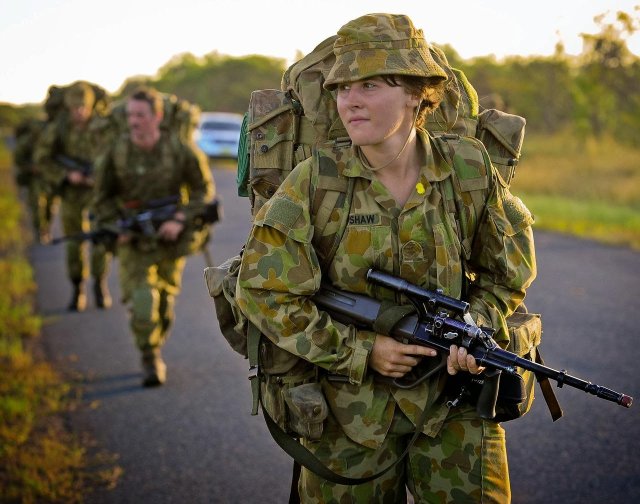
In recent difficult economic times, with youth unemployment at record rates, there is still one major state institution which is always recruiting — the military.
As they have in the past, the armed forces are trying as hard as possible to present an attractive job prospect to the youth market. The offer of a career, job stability, qualifications and training can often seem too good to pass up.
The latest federal budget saw the allocation of a further $750 million to military expenditure. In a time of relative austerity, and with a “budget emergency” only nine months ago, this is a clear indication of government priorities.
The government has demonstrated a general indifference towards Australian youth, especially the underprivileged and the unemployed. However due to the natural demography of warfare, there will always be a demand for new recruits, and recruitment strategies are very good at targeting youth.
There are three primary forms of compensation for military service, the most obvious being guaranteed wages and a career. There is also the offer of training and qualifications as well as social prestige.
In a capitalist society, money is the obvious and easy reward to offer for any kind of arduous or unusual work, and military service is no different. In a period of rampant casualisation where reliable employment is difficult to find, the promise of not just “decent” pay but also a consistent career with advancement and promotion opportunities is used as a serious incentive for youth to enlist.
Increasingly the Australian job market has become structured so that the prospective employee, not the employer, bears the cost of training. This includes university degrees, vocational/TAFE training and ongoing professional development.
With an unrelenting drive to deregulate university funding and remove caps on training costs, this issue is only likely to get worse. Consequently, any organisation still willing to provide training and qualifications of the technical, clerical and academic nature presents a tempting offer.
Perhaps most problematic from the point of view of national culture, is the issue of social prestige that has begun to play an increased role in recent years. It has been well-established that unemployment, or employment in low-prestige jobs (such as retail, labouring, or hospitality), is a contributor to low self-esteem among the young and disadvantaged.
Feeding in to this was the crescendo of nationalistic and militaristic fervour experienced during the recent 100th anniversary of the ANZAC landings at Gallipoli. This narrative is calculated to ensure an association between military service and “guaranteed” social prestige in the minds of the public and Australian youth.
This ties in effectively with the current policy attitude encouraging a security culture, a strong in-crowd mentality and the tendency to ignore material history in favour of military mythology. A particular example includes recent changes in military customs and badges being portrayed as much older and more “traditional” than historical studies bear out.
The Australian tradition of military service originates in the British colonial era, and many relics of this dated world view remain today. The Prime Minister's decision to knight retired Air Chief Marshal Angus Houston indicates that this thought of a commanding class of knightly officers grandly issuing orders to the loyal peasantry still runs strong among the Australian ruling class.
Contradicting this is a parallel tradition of the working class digger “having a go”, sticking it to the stuffy Brits and gaining advancement through merit.
Ultimately both of these myths serve to mask the reality of life in 2015.
The Australian government, like other Western nations, is using its military forces to project power among perceived “weaker nations” to achieve imperialistic goals. This dual mythology ensures that few questions are asked in public conversation, and even fewer answered, about the ultimate purpose of the Australian armed forces.
The traditional aspects of military service however are being undermined by the restructuring and civilianisation of the military establishment. Mercenary forces like Blackwater or amalgamated forces like the Border Force are seen as unprincipled and unaccountable even by the aristocratic military elites.
While military force serves the interests of the ruling class, it is poor and working class people who fill the ranks. This will only become more true as social services that provide alternatives to the armed forces are eroded.
Ultimately, it is up to young people, both inside and outside of the armed forces, to fight for a future where young people can find stable lives helping people and planet, rather than profit and war.
Like the article? Subscribe to Green Left now! You can also like us on Facebook and follow us on Twitter.